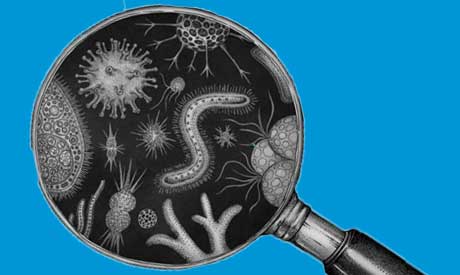GW’s Computational Biology Institute (CBI) has been awarded a grant by the Virginia Innovation Partnership to accelerate innovation and economic growth in Virginia for their proposal “Next Generation Diagnostics.” CBI plans to commercialize new methods of pathogen diagnostics using a novel combination of genomics and informatics.
The Virginia Innovation Partnership, created in 2012 as part of the U.S. Department of Commerce’s i6 challenge, recently awarded $800,000 to 18 university research projects in Virginia, to “build value for the Commonwealth by creating Virginia-based start-up companies, attracting established corporations to invest in Virginia, and enhancing the licensing potential for technologies.”
“This visionary program initiated by the White House and U.S. Department of Commerce aims at the best point of leverage which America still enjoys over global competitors – the early-stage value creation occurring in the nation’s research universities,” said Thomas C. Skalak, vice president for research at the University of Virginia and principal investigator on the i6 grant. “This proof-of-concept program develops truly new ideas and the teams behind them into investment-ready projects, which creates new jobs and economic growth for the state and nation.” (Extracted from UVA Today, “Virginia Innovation Partnership Awards $800,000 to University Research Projects,” Jan. 7, 2014)
Dr. Keith Crandall, director of GW’s Computational Biology Institute, says the $30,000 award, to be used by Sept. 30, 2014, will help launch their startup company, NextGen Diagnostics, by funding validation work. They hope their newly developed PathoScope software, which uses advances in DNA sequencing to quickly and accurately identify pathogens, will make their company a competitive player in the growing molecular diagnostics market.
“Many researcher/entrepreneurs believe in the ‘you build it, they will come mindset,’ but reality is far different," said Thomas Russo, GW’s Assistant Vice President for Industry and Corporate Research, who served as a mentor for Dr. Crandall’s team. "Providing physical space and support for NextGen Diagnostics is just one component of GW’s strategy to support early stage companies. GW became a node for the NSF-funded I-CORPS program in 2013, giving Keith and his team a chance to participate in the program, which assists entrepreneurs coming from universities to cope with the business challenges facing a start-up. The I-CORPS experience helped NextGen Diagnostics better position themselves in the marketplace,” said Russo.
They will use the Virginia Innovation Partnership award to validate their work using aquaculture-related fish species and infectious agents, as well as benchmark their results against standard industry methods in collaboration with colleagues in Chile and at the U.S. Fish and Wildlife Service. This will allow the company to create an in-depth example of their technological innovation and perform demonstrations to build a customer base and seek additional partnerships.
The company will initially target customers in the animal health field, including aquaculture, livestock, food safety and wildlife (including zoos). They plan to seek partnerships to work on human pathogens in the future.
“It can be hard to differentiate between strains of pathogens,” Dr. Crandall explained. “It can take up to four weeks to diagnose fungal pathogens, and there is a high degree of false positive results with other approaches. Using our genomics approach, we can diagnose a broader array of pathogens (fungus, virus, bacteria, parasite) with greater accuracy and a faster turnaround time –all in a single experiment.”
The value proposition of the PathoScope software includes:
• Faster Service: results in 2 days instead of up to 4 weeks (fungal pathogens) or 2 weeks (bacterial cultures);
• Single Test for all Pathogens: simultaneously identify all pathogens (e.g., viral, bacterial, fungal, parasite) from any tissues in a single test (compared to conducting individual tests for individual pathogens); and
• More Accurate Results: high throughput next-generation sequencing technologies and advanced Bayesian statistics provide more accurate results than other molecular based approaches.
The incubator, currently located at GW’s Virginia Science & Technology Campus (VSTC) in Ashburn, Va., plans to capitalize on the close proximity of Dulles International Airport to fly samples in from around the world. They hope to be a key driving force in the growth of a biotech industry cluster by encouraging other start-up companies to locate nearby.
“We are delighted that NextGen Diagnostics has emerged from the intellectual activities and research performed on our Campus. We welcome and encourage the spirit of innovation and discovery with tangible applications, in this case, in the biotech sector. This will provide collaborative research and partnership opportunities for GW, employment opportunities for our graduates, as well as being beneficial to the local economy,” commented Dr. Ali Eskandarian, Dean of the Virginia Science & Technology Campus.
Next Generation Diagnostics’ growth will likely create positive economic developments throughout the Commonwealth as their interactions increase with Virginia-based diagnostic companies. They also plan to work with state hatcheries and the Smithsonian Conservation Biology Institute in Front Royal.


